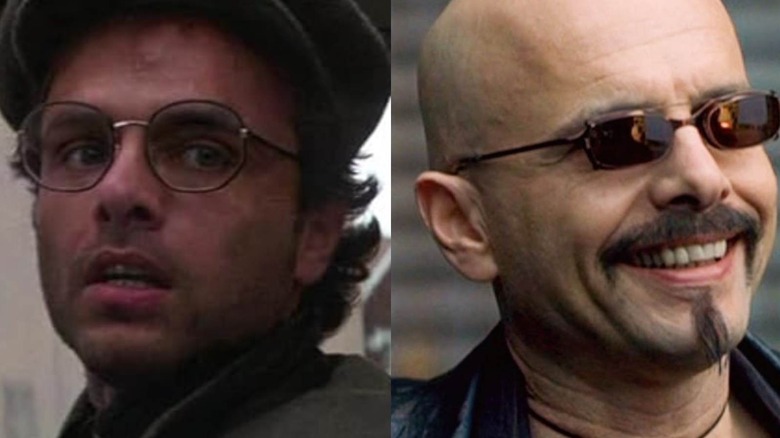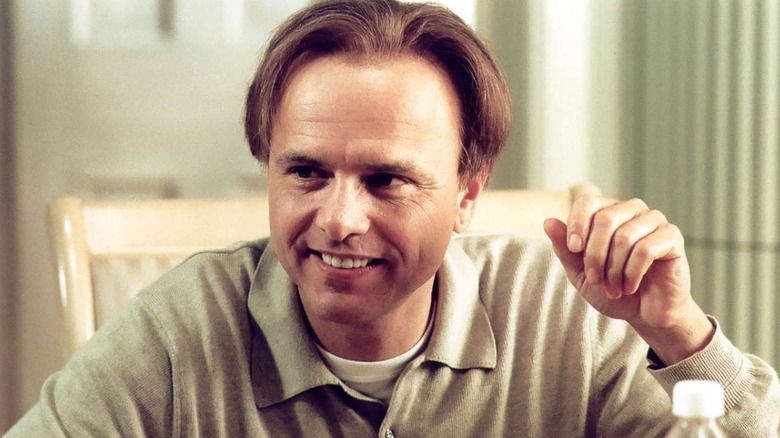Who Plays Eugene In The Last Of Us Season 2
Spoilers for "The Last of Us" season 2, episode 6 follow.
Since the beginning of "The Last of Us" season 2, a name has been thrown around within the confines of Jacksonville that we've been keen to learn more about. This week, we finally got properly introduced to Eugene, the late husband of Gail (Catherine O'Hara), who we discovered was killed by Joel (Pedro Pascal) sometime between the show's two seasons. Much like how Frank was only referred to in the game but expanded on in season 1 thanks to the help of Murray Bartlett and his screen partner Nick Offerman as Bill, Eugene was a character that was only skimmed over in "The Last of Us Part II" video game. Explored through notes that Ellie (Bella Ramsey in the show) found on her travels, the live-action adaptation instead spent a healthy amount of time finding out about Eugene before Joel did the deed, making another heartbreaking story.
In the show, Eugene is played by Joe Pantoliano, and like Offerman and Bartlett, does an incredible job of bringing a small character in this massive world to the forefront. It shouldn't come as a surprise, though. With a career as eclectic as his, Pantoliano has brought all manner of characters to life appearing in over 150 television shows and movies. Standing out with just about any character he's been handed, his most notable roles were in now revered classics from the '80s and '90s.
Joe Pantoliano was an awesome 80s and 90s character actor
Flick through Pantoliano's back catalog and you might find yourself at risk of adding a dozen or so films to your watchlist this week. One of his notable roles was being a member of the infamous child-chasing, criminal family, The Fratellis, in Richard Donner's beloved classic, "The Goonies." Pantoliano played Francis, who absolutely didn't wear a toupee and ended up in prison thanks to the band of treasure-seeking kids, making us wonder if we'll see him again thanks to Warner Bros plans to make a brand new sequel. In addition to that, Pantoliano also appeared in landmark films like "The Fugitive," "Memento," and "The Matrix," as well as playing the legendary Captain Howard in the "Bad Boys" franchise, who, even after being killed, was brought back for "Bad Boys: Ride or Die."
Speaking to Vanity Fair about his surprise video to Mike (Will Smith) and Marcus (Martin Lawrence), Pantoliano felt that it was the audience reaction that got him back for the fourth movie. "But, to the fans, God bless you because I think they got a lot of mail about killing me off." It was a reprisal he was more than willing to take, for a film that conquered the box-office upon release and left Pantoliano considering ways of bringing Howard back permanently. "I told them, 'Why couldn't you just put me in a hospital bed, pretending that they killed me? Put me undercover like they did in 'The Godfather.'" Honestly? It's not a bad idea.
Joe Pantoliano was Sopranos scumbag Ralph Cifaretto
In "The Sopranos," there are enough amazing characters to form a queue outside Satriale's. It was in the third season, though, that Joe Pantoliano turned up as one of the show's best characters, Ralph Cifaretto. As the "Gladiator" quoting captain, Ralphie turned up and became a high-level nuisance for Tony Soprano (James Gandolfini), courtesy of his dark sense of humor and generally chaotic nature.
It was a performance that earned Pantoliano an Emmy, and rightfully so. Ralphie was a psychotic, twisted character reminiscent of Joe Pesci's Tommy from "Goodfellas" and just about any unhinged liability that ever appeared in a mob story. You also couldn't take your eyes off him. Speaking to Hot Press about the character, Pantoliano confessed he didn't expect just how much of a mark he'd leave in television history. "The power of that character and that show took me unawares," he explained. "I had no idea joining 'The Sopranos' that Ralphie would end up more or less defining me. That's the power of TV and being in people's living rooms every week. It can be a much more intimate and personal experience than film."
Following this week's episode of "The Last of Us," that's a point that's certainly been proven.


